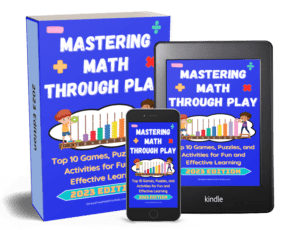Parents are math teachers too! Often when I am talking to parents about how they can help their child in math, and even homeschool if they want to, they say things like “Well, you’re a teacher and a math person- I’m not!” Recently I got to talking to Jonathan Kohl on Instagram, a dad who didn’t consider himself a math teacher but has found a lot of enjoyment in teaching his son. I asked him to write a post from the parents’ perspective. Here’s what he had to say….
Who Is Cool Math Dad?
Hi, I’m Jonathan. I’m a parent of an elementary school aged kiddo. I’m not a math teacher or a math expert. In fact, I was a bit of a math phobic in school and didn’t hit my stride until university. I expected that I would need to support my children’s math education, but I didn’t expect to become my son’s primary source for learning math. It was difficult at first, but it has become a rewarding journey for both of us. Here are some tips based on what I have learned along the way.
Questions Parents May Be Asking
If you’re reading this, then you, like me, have found yourself wondering how you can support your own kiddos with math. You, like me, probably feel unqualified, and worry about your child’s skills. Are they at the right level for their age? Are they going to fall behind? Will any of their struggles with math hold them back in their academic career? What can I do?
When our children bring home math work that we are unfamiliar with, it can be intimidating. We learned certain math topics in school, and we learned certain approaches to math, years ago. It can be hard to understand something new. As a parent, you feel pressure to step in and help. How do I catch them up with their schoolwork? How do I help them with their assignments if I don’t know how? When you start researching, it feels overwhelming. However, this approach isn’t playing to your strengths.
Home Doesn’t Have To Look Like School
Don’t try to be like a math teacher in a school, instead let home be the “anti-school”. Use your knowledge and skills to help your child become fluent and confident in math differently than in the classroom. This is where you come in as a parent, this is your strength. You can teach them what you know, and how to make math real for them. You can demonstrate good problem solving approaches, and how to try again when things don’t work. These are things that you can do better than the school can. Teaching your children math differently than what they learn in school is your parent math coach super power.
Four Things You Can Do Right Now
You’ve already got the skills to start helping your child with math now. It just might require a bit of a thinking shift, and having confidence in yourself.
1. Make Abstract Math Real
Classrooms are busy places, and students don’t get a lot of one-on-one time with a teacher. When you are at home together, you can spend more time talking about math. Having discussions about math and learning together is incredibly important. Also as their parent, you can observe your child and see what they struggle with, and stop and review. You can take as much time as you need to address gaps in knowledge, or to discover more about a topic than is covered in class.
Teaching how you learn new things as an adult is important. You can show your children how to research on the web, and learn new approaches together. You can practice until your child has mastery of a subject, and you can stop at any time and review. If your child has a lot of interest in a topic, you can use the web to help them explore it to their heart’s content.
We can make math real for our children by helping them visualize abstract equations. We can do this by using household objects or math manipulatives to map out arithmetic equations. For example, you can use LEGO bricks to visualize multiplication problems. You can use food for division problems: “Divide up these 20 grapes into 4 equal parts.” Round foods lend themselves perfectly to fraction problems. Recycling can be repurposed to map out geometry or algebra problems. It’s easy to get started, and there are lots of inexpensive math manipulatives you can purchase, or if you are crafty, make yourselves at home. Even algebra, geometry, statistics, calculus and other topics are greatly enhanced with different objects and visuals.
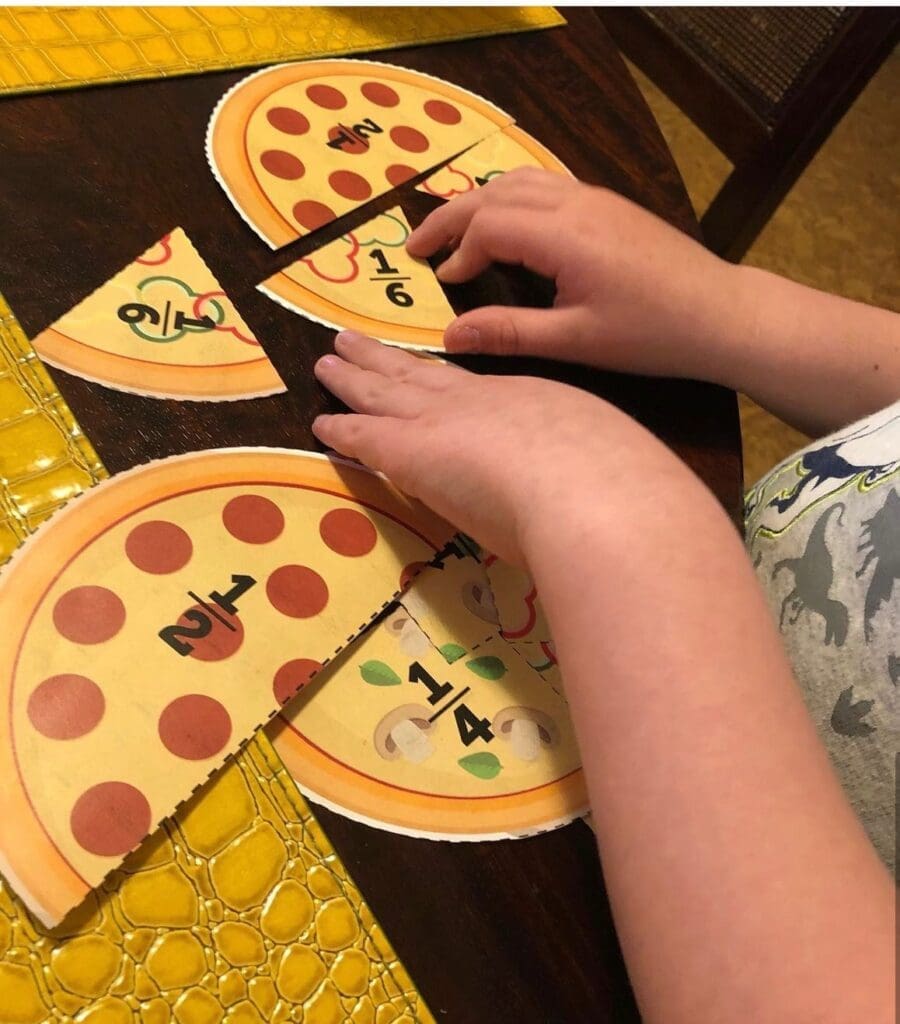
2. Talk about math!
Discussions about math and how you do mental math are incredibly helpful. Number sense is an important skill to develop, and as an adult, you have years of creating your own brain hacks to help. Share your math thinking hacks with your child, have them share their own mental shortcuts, then research others to learn together. It’s helpful to be able to discuss our thinking in math, and have our children explain their thinking to us. Breaking down restaurant tip estimation, simple arithmetic shortcuts, determining size, looking at symmetry and measurement and a million other little things we do every day is great skill development for students.
Visualize everything, and have discussions. This will lead to a much deeper understanding of math topics, and more confidence.
3. Help Children With Emotional Regulation
If you are reading this, you probably have concerns about your child’s math education. If you are concerned, imagine how they feel. They probably have a lot of anxiety and fear, and those emotions are getting in the way of their problem solving skills. A big contributor to success in math is the confidence in yourself to be able to solve a problem, even if you struggle at first, and it takes a few tries. Confidence is a major factor in math success, and while it might not seem like it at first, it is a vital skill for working with math.
One thing that can really help is to observe your kid and see what makes them uncomfortable. You know your child best. When this happens, shift your brain out of math mode and go into support mode. Help them identify the emotions and deal with them before resuming math work. Approaches like Growth Mindset are very helpful with these sorts of issues.
Identifying and managing emotions can be difficult, but there are resources that can help. Big Life Journal is a popular system.
Helping With Math Anxiety

If any kind of math work is fear or anxiety provoking for your child, change the math context for them. Make math silly and fun. Utilize toys or games or topics that your child enjoys. Play pranks on each other using math. Find some math jokes. Set the tone to be fun and light instead of heavy and stressful. Get up from the desk and move, go out in nature, do some exercises and dance.
If only certain topics are difficult, switch to non-counting topics like symmetry, math games, and repeated patterns in nature. Gently ease the confidence building, more fun activities back to the topics they need support with by discovering connections.
Perfectionism
If perfectionism is a problem (and it almost always is, sadly) reframe “wrong” answers to something else. In our family, we talk about “iterating” towards a solution, because that is what we do in our professional lives. We also do it around the house, particularly with problems we haven’t solved before, like new recipes, a home improvement project, or a new approach to chores. Instead of rewarding correct answers, reward approach, and use incorrect answers as a fun opportunity to learn more. Make “wrong” a fun reward, as best you can.
If your child has serious issues with math, seek professional support. Don’t dismiss it as a growing pain or hope they catch up or outgrow it. If they are showing serious signs of distress, find professional support.
Math requires a certain level of concentration, focus, and persistent problem solving. People rarely have instant mastery of math problems, and it requires deeper thinking than a superficial fleeting idea. Any brain power that is being used to deal with negative emotions makes it that much harder to succeed at math. Furthermore, you have to try and try again, which can be demoralizing for children who are expected to instantly know the answer.
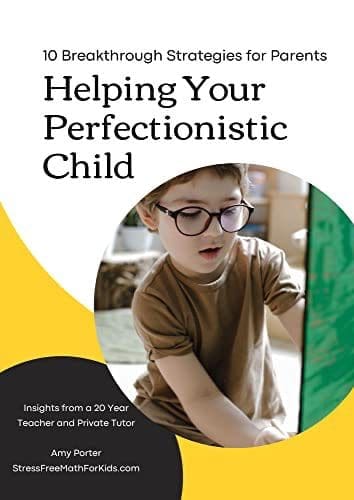
4. Show Them Your Mistakes
Schools tend to emphasize speed and accuracy in math, but that isn’t how applied math works in the real world. No one gets the right answer the first time when solving problems. Math is a field that requires focus, persistence, and resilience. It can take a lot of time and attempts to get the correct answer. Resilient problem solving is a skill you can help children learn.
When you are supporting your kids with learning, it helps to have friends who know what they are doing. My friend Dr. Katie Crossman is an education expert, and she suggested I show my child when I make a mistake around the house. I find kiddo, show them the problem, and then we discuss ways we can fix my mistake. I model the behavior of creative problem solving, having a positive attitude, and persistence. We then use this when we are working on math together. If something goes wrong, we identify the cause, address it and try again. We repeat this until we are happy with both our approach to solving the problem as well as our answer.
When I was a rookie programmer, I made a huge mistake. Every time I tried to fix it, I made it worse. Finally, I swallowed my pride and I asked an experienced colleague for help. They laughed, helped me fix it, and then told me something that has stuck with me ever since:
“The difference between an amateur and a professional is that a professional knows how to fix their f— ups.”
If I could encapsulate working in STEM with one sentence, that would be it. It also accurately describes learning in math. We make mistakes all the time, and we have to work at it several times to get the right answer. In fact, we are so bad at math accuracy, we invented computers to help us. Yes, that’s why we created computers, to help us with our ability to perform accurate math calculations.
Tips to Get Started
Here are some helpful tips for learning math at home.
1. Social Media is Your Friend
It’s astounding how much free information is out there that math educators share every day. Take a break from doomscrolling for a few minutes and search for math content on social media platforms. I have learned a tremendous amount to help support my kid from Instagram posts and TikTok reels. Furthermore, many posters provide freebies that you can use, and you can try these before you buy math exercises from resources like Teachers Pay Teachers. I can’t stress enough how much I have learned from social media content. If you search for any of the suggestions here, you will find entire accounts dedicated to homemade manipulatives, to how parents can support their child’s math, and quick visualizations of any math problem you can imagine.
2. E-learning Content is a Goldmine
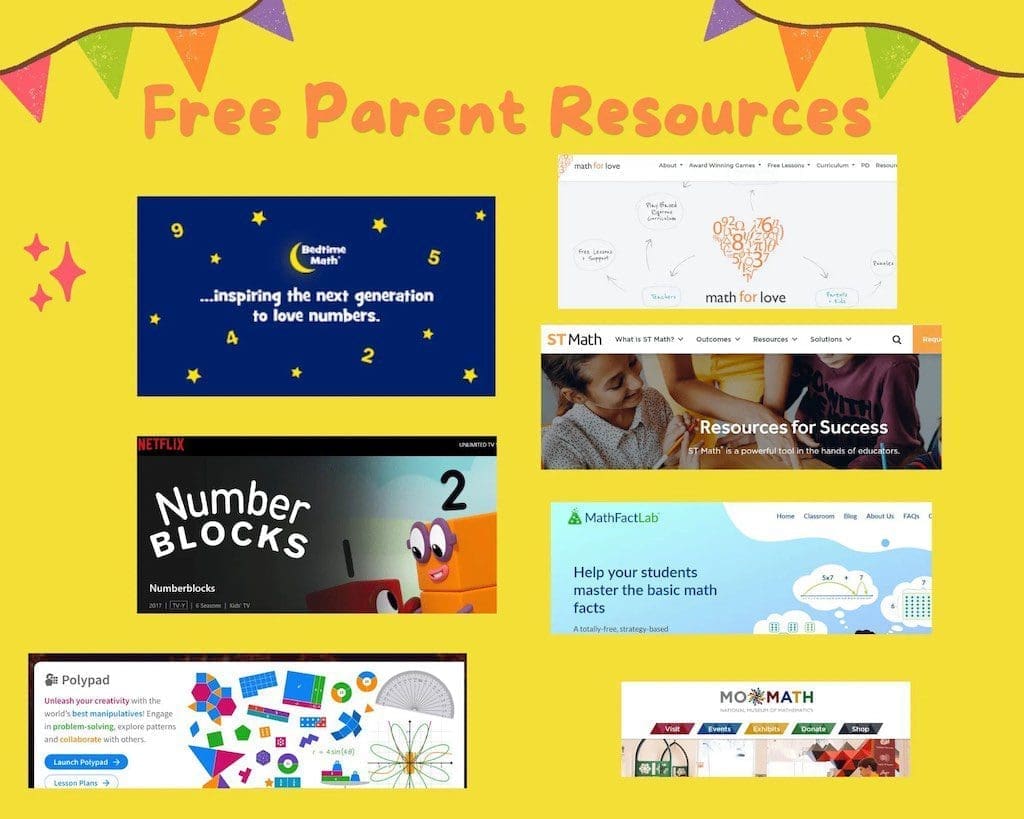
You have access to thousands of other teachers and experts. Some formalize lessons through e-learning platforms like Khan Academy or Youtube, while some have talks, papers, blogs and books you can use as well. They can supplement whatever you do at home, and you can learn and try things out together with your child. We have access to world experts who can teach us about any topic, right from a device we carry in our pockets. You can find the top experts in the world and you and your child can listen to their content and learn. It’s amazing.
(see SFMK’s list of websites for kids here and free online resources for parents here)
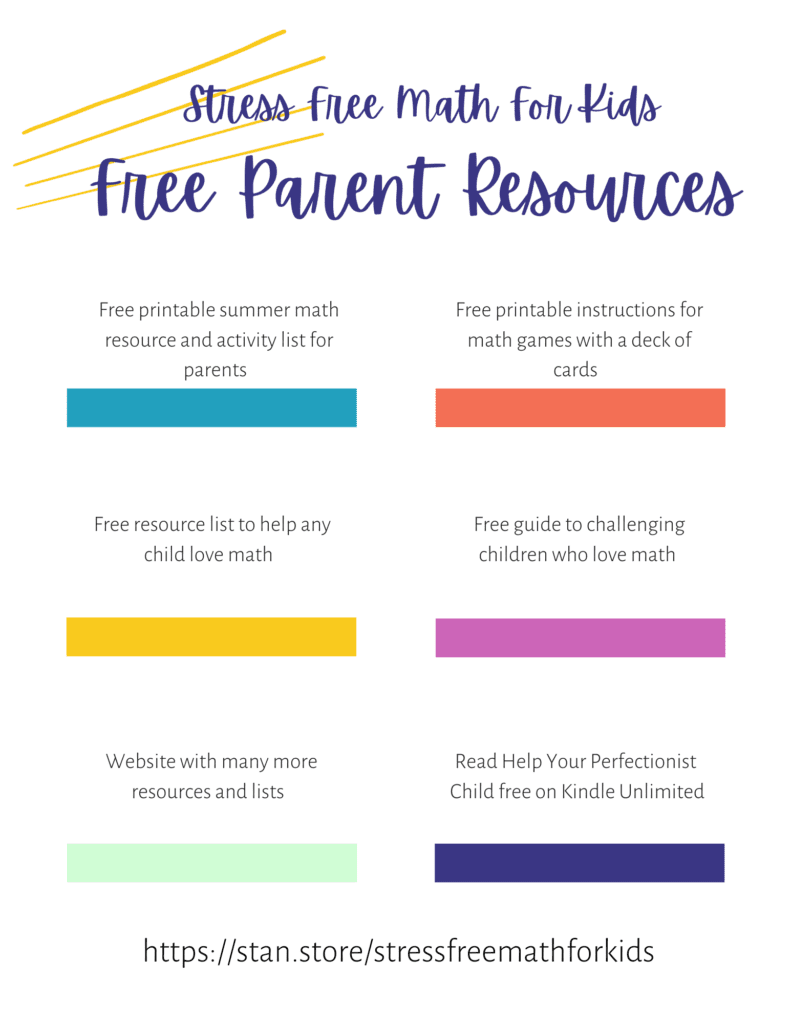
3. Keep It Short
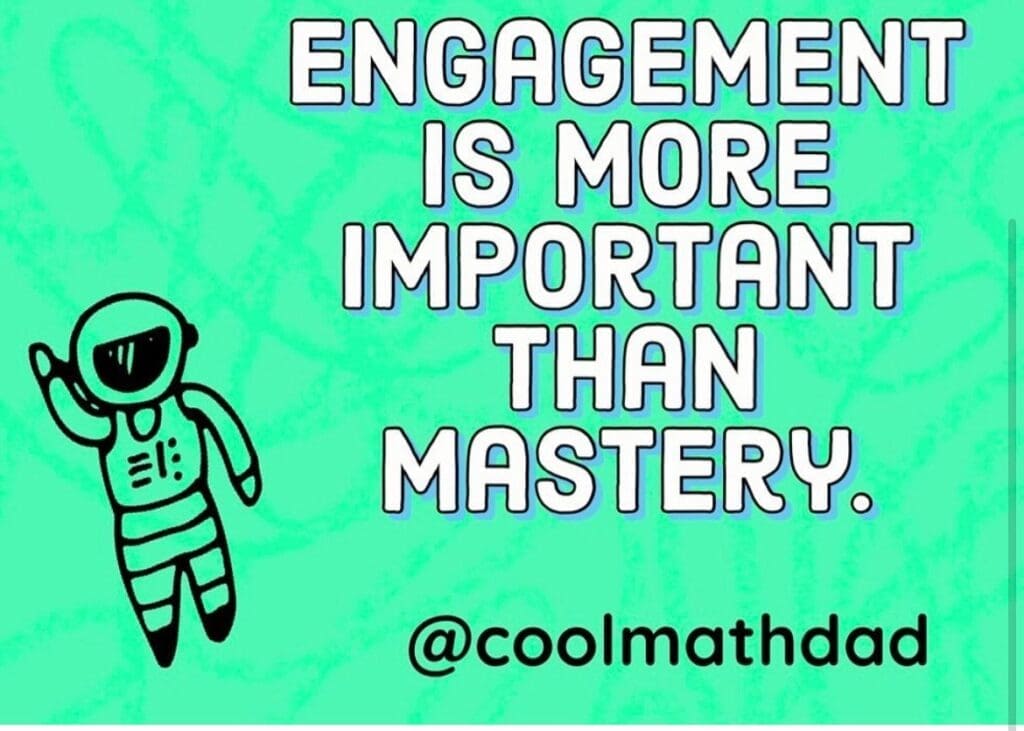
It can be tempting to try to spend a while on a lesson, just like in class. You might schedule a half hour or an hour for math learning, but you really don’t need that. In fact, your child can get a lot from quick five minute lessons here and there. If they have the interests for it, then by all means go longer, but try to keep your math work short and sweet. That way neither of you burn out. Also, don’t suck the fun out of life by making absolutely everything you see an object lesson about math. Pick your times, and follow the interest and questions of your child to determine the length of today’s math session.
4. Don’t disparage approaches to math because you are unfamiliar with them.
No child wants to hear our “Back in my day we had it worse…” stories, and different approaches to learning math are just as valid as what you remember learning. When you disparage the unfamiliar, you undermine math education for your child. Instead of feeling defensive because you don’t know, turn it into a co-learning lesson where you figure out a new approach together. It’s fun to learn alternative approaches with your child, and technology and the web makes it easy for you to pick up new approaches quickly. Telling your child that you don’t know how to do the approach they are struggling with either, then learning together, is teaching them more than you know.
Conclusion
As a parent, you know a lot more about math than you think. You can do this, really, you can. Be the anti-school teacher and still help your child learn math and valuable life skills. All parents have important math expertise, no matter how simple it seems to you. Most importantly, you can change your child’s math learning experience with a bit of research, learning and patience. The time you take with your child sharing and learning together will boost their math skills.
Don’t try to be a teacher at school, be parent-kid learning cool. And remember that parents are math teachers too!
About the Author

Jonathan Kohl works in the software industry, and is a Dad and learning coach to an elementary school aged child. He posts about his experiences on Instagram @coolmathdad



